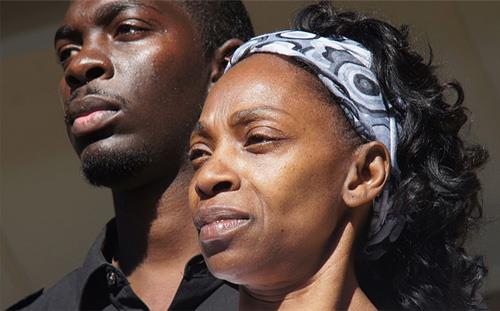
Miscarriage of justice stories have become a television staple of late, and Jacqueline Olive's documentary Always In Season calls attention to another disturbing case.
Always In Season, which premieres Monday at 10 p.m. ET (check local listings) in the PBS Independent Lens series, asks whether a black teenager who was found hanged in 2014 committed suicide, as law enforcement concluded, or was murdered, as his family fears.
Olive's film doesn't follow the exact path of most justice-or-injustice stories, because it also uses the death of 17-year-old Lennon Lacy to explore the larger issue of racially motivated lynchings in America over the past century and a half.
Lacy was found hanging from a swing set in the playground area of a Bladenboro, N.C., housing project in August 2014. The police found no evidence it was anything other than suicide, and after the FBI heeded a request to take another look, that agency came to the same conclusion. The case was officially closed in 2016.
Claudia Lacy, Lennon's mother, says she isn't buying.
She and other family members, including Lennon's brother Pierre, said Lennon had shown no signs of depression or mood changes. He was a regular teenage kid, they say, who had spent part of that day gathering up his equipment in preparation for the start of football practice.
Quite possibly more significant, Claudia Lacy says, is that Lennon was dating a white woman, and that woman had heard warnings from her neighbors that interracial dating was "not right." She, too, believes Lennon was murdered and strung up to make it look like a suicide.
Claudia Lacy and Olive note other things that don't seem to quite fit, like the fact that Lennon was found wearing size 10½ sneakers when he wore a size 12.
Claudia Lacy, and her sympathizers inside and outside the black community, say police were too quick to close their investigation and did not look seriously enough at the possibility of foul play.
When Lennon's mother says she deserved more information, and sooner, it's hard not to agree.
Always In Season does not present the strong specific alternative scenario that some miscarriage of justice shows have done. It argues that based on what is known, reasonable doubt has been raised.
Toward that end, Olive bolsters her argument by devoting more than half of Always In Season to the broader history of lynching in the United States.
An estimated 5,000 people were lynched between 1890 and 1950, the experts say, most of them black men. Beyond the disregard for fundamental American principles of due process, these lynchings collectively served a very specific purpose: terrorism.
Many lynchings were more like the 1934 case of Claude Neal, whose death becomes a focal point here. The local lynch mob not only declared its intentions in advance but invited "all white people" to come watch.
Thousands did, making this their family entertainment on a warm August afternoon.
The message was simple: Know your place and know that the white power structure can do whatever it wishes.
And know that some greater moral force isn't out there to save you. All these white people who wouldn't lynch you themselves know someone else is doing it and have no problem with it.
That message is appropriately chilling and bolsters the warning of Always In Season that we haven't entirely left this sort of justice in the rearview mirror.
That doesn't prove Lennon Lacy was lynched. It does suggest we don't always shed the worst parts of our DNA.
The title of this show, by the way, alludes to "Strange Fruit," the 1930s anti-lynching song that reminds us everything America did then was not great.